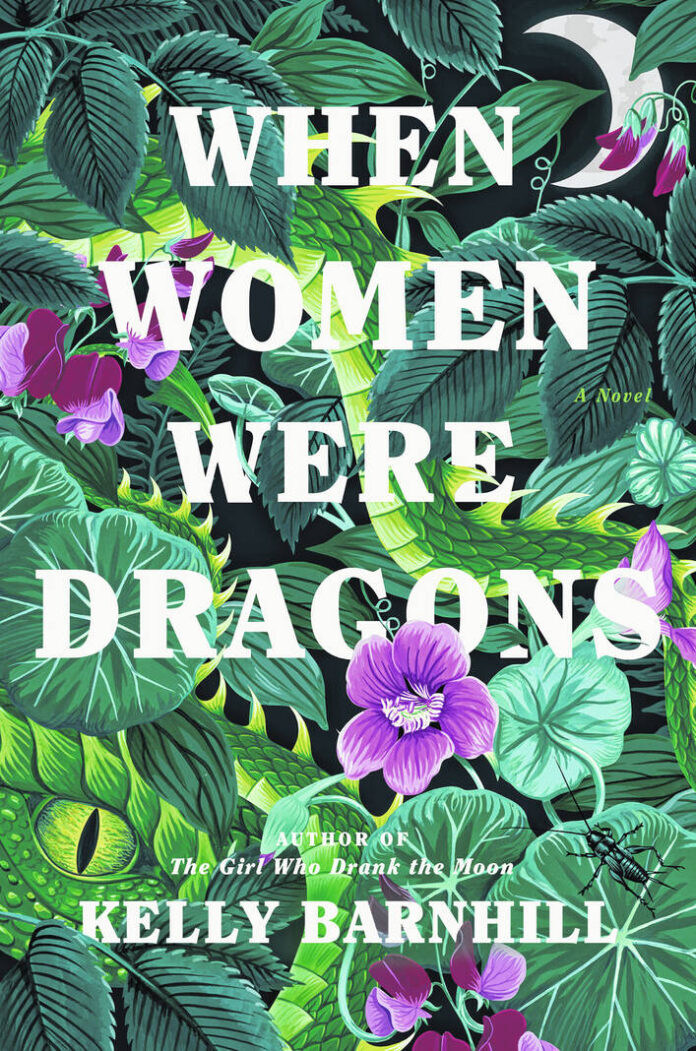“When Women Were Dragons,” by Kelly Barnhill. (Doubleday, $28.)
Dragons! Dragons! Dragons!
What could be bad about that? Well, as it turns out, plenty, when women in 1950s America and beyond spontaneously turn into them in Kelly Barnhill’s “When Women Were Dragons.” The novel deftly weaves multiple characters from multiple eras, fictitious redacted government documents, and rapturous dragonings into a powerful exploration of the feminine divine. For its sensibility, gorgeous writing and sublime storytelling, this was probably my favorite read of the year.
— SHANNON GIBNEY
“Pig Years,” by Ellyn Gaydos. (Alfred A. Knopf, $27.)
You will never view pigs the same way after reading Ellyn Gaydos’ remarkable memoir — nor farmhands, either. In this serious, beautiful book, Gaydos writes about working on farms in northern New York and Vermont. She thinks deeply about the land, the hardworking but often impoverished people who work it, and the animals — especially the pigs, which she raises each summer, admires and adores, and then slaughters. There is nothing romantic about this work, but in Gaydos’ hands there is much beauty.
— LAURIE HERTZEL
“Camera Man,” by Dana Stevens. (Atria Books, $29.99.)
Buster Keaton, the best-ever physical comedian, forged an unusually varied showbiz career. As Dana Stevens demonstrates in “Camera Man,” Keaton’s distinctive professional path — he was a preteen vaudevillian, a silent-movie auteur, a prematurely obsolete ex-star and an unlikely TV pitchman — remains one of the great sagas in American life. With fascinating digressions about the post-World War I development of new filmmaking technologies and the rise of literate movie criticism, this is an affectionate, insightful portrait of a crucial figure in entertainment history.
— KEVIN CANFIELD
“Afterlives,” by Abdulrazak Gurnah. (Riverhead, $28.)
Nobel laureate Abdulrazak Gurnah’s 10th novel begins in the early 20th century in what was German East Africa and moves through the world wars and British rule to independence in the 1960s. Europeans, though present, are bit players and this unaffected but brilliant novel’s focus is on the lives of a handful of ordinary Africans. Rich in character and compassion, the novel, though distressing at times, is truly kindhearted. Everyone I know who has read it has loved it.
— KATHERINE A. POWERS
“Super-Infinite: The Transformations of John Donne,” by Katherine Rundell. (Farrar, Straus & Giroux, $30.)
Katherine Rundell’s richly absorbing biography illuminates the various incarnations of a unique Renaissance man. John Donne was a libertine, lawyer, pirate, politician and priest.
He also wrote some of the finest and most original love poetry in the English language. “Super-Infinite” chronicles a difficult life and examines sublime poems which, according to Rundell, “if allowed under your skin, can offer joy so violent it kicks the metal out of your knees, and sorrow large enough to eat you.”
— MALCOLM FORBES
“The Birdcatcher,” by Gayl Jones. (Beacon Press, $24.95.)
Catherine, a sculptor, and her husband Ernest, a writer, are both quite close to Amanda, a travel writer. The three artists mostly manage the challenges of their eccentric triangle and even its sensational complication — Catherine keeps trying to kill Ernest. After a 22-year hiatus, Gayl Jones returned last year with the acclaimed “Palmares,” a Pulitzer Prize finalist. “The Birdcatcher” is outstanding, too — a structural masterpiece.
It’s brilliant, entertaining, and charged by Jones’ wild imagination and distinctive voice.
— MICHAEL KLEBER-DIGGS
“Embrace Fearlessly the Burning World: Essays,” by Barry Lopez. (Random House, $28.)
Heart and mind combine in these posthumously published essays to redirect our focus on the natural world. Reporting from as far as the bow of a ship on a raging Antarctic sea to as near as the “familiar and ever new” woods in Oregon, award-winning writer Barry Lopez advances the argument that our redirection is long overdue. It must also involve rapt attention and unwavering dedication “to the physical Earth and to all its creatures, including ourselves.” A timely, moving collection that cuts to the burning core of today’s most pressing issues.
— ANGELA AJAYI
“Shrines of Gaiety,” by Kate Atkinson. (Doubleday, $29.)
Wonderfully balanced between the literary bravura of novels like “Life After Life” and the more mundane but ample pleasures of her Jackson Brodie mysteries, Kate Atkinson’s “Shrines of Gaiety” puts a cast of irresistible characters into an intriguingly convoluted plot set in post-WWI London, wafts a Shakespearean air of antic enchantment over the proceedings, and keeps you guessing till the end — even as something tells you everything will be all right. Mostly.
— ELLEN AKINS
“The Passenger,” by Cormac McCarthy. (Alfred A. Knopf, $30.)
The winner of the Pulitzer Prize and National Book Award floors it off the cliff, Thelma-and-Louise-style, with a mind-bending thriller set in the 1970s and ’80s, broad as the cosmos and rendered in gorgeous, symphonic sentences. The Western siblings, Alicia (dead) and Bobby (alive), dance around their father’s legacy as an architect of the Hiroshima bomb — and their illicit attraction to each other — amid a cast of petty criminals, red herrings, befuddled psychiatrists and vaudevillian hallucinations. American fiction at its muscular, searing finest.
— HAMILTON CAIN
“Joan Didion: The Last Interview.” (Melville House, $17.99.)
A new entry in the “last interview” series, this curated collection of interviews with Joan Didion is marked by her consistently brilliant way of thinking, but also by her shifts in tone over time. The interviews, presented in chronological order, offer Didion reflecting on “Play It as It Lays” and “Slouching Towards Bethlehem” in 1972; by 2021, she is responding to the global pandemic. Patricia Lockwood’s introduction — strong, smart and convincing — is reason enough to read the collection.
— JACKIE THOMAS-KENNEDY







